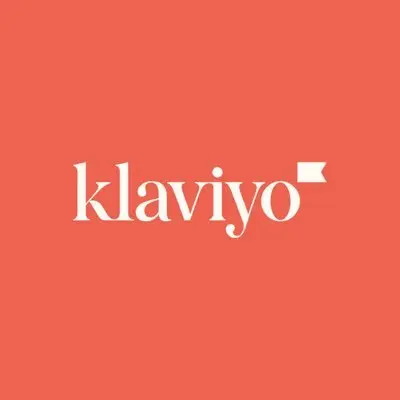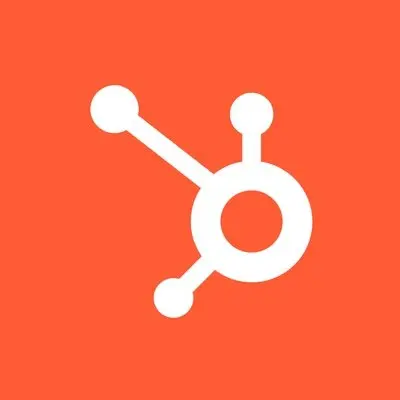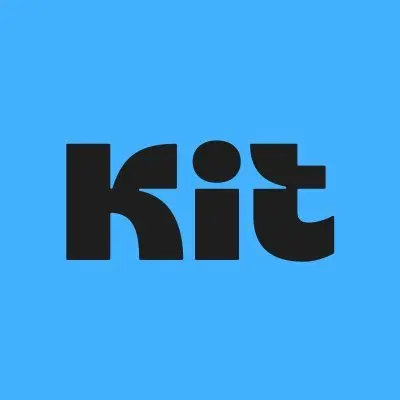AI Email Marketing Tools
Transform your email campaigns with AI-powered tools that deliver personalized content at scale. These intelligent platforms generate high-converting subject lines, predict optimal send times, and automate complex workflows, helping businesses achieve high ROI for every dollar spent.
Klaviyo
Leading AI e-commerce platform with K:AI Marketing Agent. Automates campaign creation, provides predictive analytics, and delivers hyper-personalized product recommendations based on behavior.
HubSpot
All-in-one marketing automation with 2025 AI enhancements. Generates complete campaigns from simple prompts with AI-powered content creation and predictive lead scoring.
ActiveCampaign
Advanced automation with 28 new AI features in 2025. Delivers predictive sending, behavioral prediction, and intelligent automation builder for complex customer journeys.
Brevo
Multi-channel CRM with AI optimization and email-send-based pricing. Combines transactional emails, SMS, and WhatsApp with unlimited contacts across all plans.
Omnisend
E-commerce automation specialist with AI-powered subject lines and personalization. Features cart recovery, product recommendations, and behavioral triggers with 30% multi-month discount.
Seventh Sense
Specialized AI for send time optimization with deep HubSpot and Marketo integration. Uses predictive algorithms to determine optimal delivery timing for each subscriber.
GetResponse
Marketing platform with AI email generator and automated workflows. Includes AI tools even in free plan, plus webinar hosting and conversion funnel builder.
Mailchimp
User-friendly platform with Creative AI Assistant for small businesses. Generates content, designs templates, and optimizes campaigns with predictive demographics for beginners.
Moosend
Affordable email platform with AI-powered segmentation and automated workflows. Budget-friendly option with essential AI features and landing page builder.
Kit
Creator-focused platform with basic AI recommendations and send time optimization. Built for bloggers and content creators with generous free plan for up to 10,000 subscribers.
Compare AI Email Marketing Tools
Quick comparison of features and capabilities
| Tool | Best For | Key Features | Pricing | Rating |
|---|---|---|---|---|
| E-commerce AI leader |
|
$20/mo for 500 | ★★★★★ 4.8 | |
| All-in-one marketing |
|
$20/mo Starter | ★★★★★ 4.8 | |
| Advanced automation |
|
$15/mo Starter | ★★★★★ 4.7 | |
| Multi-channel CRM |
|
$9/mo Starter | ★★★★★ 4.6 | |
| E-commerce automation |
|
$16/mo Standard | ★★★★★ 4.5 | |
| Send time optimization |
|
$149/mo Basic | ★★★★☆ 4.4 | |
| Marketing funnels |
|
$19/mo Email | ★★★★☆ 4.3 | |
| Small business |
|
$13/mo Essentials | ★★★★☆ 4.2 | |
| Budget conscious |
|
$9/mo Pro | ★★★★☆ 4.1 | |
| Content creators |
|
$25/mo Creator | ★★★★☆ 3.8 |
Note: Choose Klaviyo or HubSpot for advanced AI capabilities, ActiveCampaign for sophisticated automation, or Mailchimp for small business simplicity. Seventh Sense excels at send time optimization for HubSpot/Marketo users.
The Complete Guide to AI Email Marketing in 2025
Artificial intelligence has transformed email marketing from a simple broadcast channel into a sophisticated revenue-generation engine. With email marketing delivering an impressive $36 ROI for every $1 spent and AI-powered campaigns achieving up to 82% higher conversion rates, these intelligent platforms have become essential for competitive digital marketing strategies in 2025.
Understanding AI Email Marketing Tools
AI email marketing tools are software platforms that leverage artificial intelligence and machine learning to automate, optimize, and personalize email campaigns at unprecedented scale. These systems analyze subscriber behavior patterns, predict optimal engagement windows, and generate compelling content that adapts in real-time to maximize performance.
Unlike traditional email marketing that relies on static segments and scheduled broadcasts, modern AI-powered platforms like Klaviyo's K:AI Marketing Agent and HubSpot's 2025 AI campaign creator transform email marketing from educated guesswork into data-driven science. Today, 70% of US marketers employ AI tools in their campaigns, with the technology continuously evolving to deliver more sophisticated personalization and automation capabilities.
Core AI Capabilities Revolutionizing Email Marketing
Hyper-Personalization at Scale
Modern AI goes far beyond inserting first names into subject lines. Advanced algorithms analyze browsing history, purchase patterns, engagement behaviors, and even sentiment to create unique email experiences for each recipient. Personalized emails generate 122% higher ROI than generic campaigns.
Predictive Send Time Optimization
Tools like Seventh Sense and ActiveCampaign determine the optimal moment to deliver emails to each individual subscriber by analyzing their historical engagement patterns. This precision timing can boost open rates by up to 25% compared to traditional batch sending.
Dynamic Content Generation
AI systems automatically create subject lines, email copy, and product recommendations tailored to individual preferences. 34% of marketers specifically use AI for email copywriting, making it the most common AI application in email marketing.
Behavioral Segmentation Intelligence
Instead of static demographic segments, AI creates dynamic audience clusters that adjust in real-time based on changing behaviors, preferences, and engagement patterns. This enables more relevant messaging and higher conversion rates.
AI Email Marketing Use Cases by Business Profile
E-Commerce Powerhouses
Best Tools: ![]() Klaviyo (4.8/5),
Klaviyo (4.8/5), ![]() Omnisend (4.5/5)
Omnisend (4.5/5)
Specialization: Product recommendation engines, cart abandonment recovery, purchase behavior prediction
E-commerce brands benefit most from AI's ability to analyze purchase history and browsing behavior. Abandoned cart flows alone generate an average $3.65 revenue per recipient compared to $0.11 for standard campaigns. AI-powered product recommendations drive 40% more purchases from personalized suggestions.
- Automated Cart Recovery: Personalized product suggestions with optimal timing
- Post-Purchase Upsell: Campaigns based on buying patterns
- Seasonal Optimization: Inventory promotion with AI forecasting
- Retention Campaigns: Customer lifetime value prediction
B2B Lead Generation Specialists
Best Tools: ![]() HubSpot (4.8/5),
HubSpot (4.8/5), ![]() ActiveCampaign (4.7/5)
ActiveCampaign (4.7/5)
Specialization: Lead scoring, nurture sequences, CRM integration
B2B companies leverage AI for sophisticated lead nurturing and qualification processes. 86% of B2B companies now use personalization, with AI-driven lead scoring helping sales teams focus on prospects most likely to convert.
- Predictive Lead Scoring: Based on engagement patterns and behaviors
- Account-Based Marketing: Personalization for high-value accounts
- Sales Enablement: Trigger notifications for sales teams
- Multi-Touch Nurture: Complex sequences with AI optimization
Content Creators and Course Sellers
Best Tools: Kit (3.8/5),
![]() Brevo (4.6/5)
Brevo (4.6/5)
Specialization: Audience engagement, content recommendations, community building
Content creators benefit from AI's ability to understand audience interests and optimize content delivery timing. Creators see significant engagement improvements through AI-optimized send times and content curation.
- Course Enrollment: Onboarding sequences with AI timing
- Content Analysis: Consumption behavior tracking
- Community Engagement: Optimization for interaction
- Upgrade Predictions: Membership tier recommendations
Small Business Growth Engines
Best Tools: Mailchimp (4.2/5),
GetResponse (4.3/5)
Specialization: Easy automation, cost-effective scaling, beginner-friendly AI
Small businesses use AI to compete with larger organizations by automating personalized experiences that would otherwise require dedicated marketing teams. Email automation delivers up to 30x more revenue per recipient than one-time campaigns.
- Welcome Series: AI-optimized onboarding flows
- Retention Campaigns: Customer lifecycle automation
- Local Marketing: Event promotion with AI timing
- Product Recommendations: Simple AI-powered suggestions
Advanced AI Strategies for Maximum ROI
AI's predictive capabilities extend beyond basic personalization. Advanced platforms like ![]() Klaviyo and
Klaviyo and ![]() ActiveCampaign forecast customer lifetime value, predict churn probability, and identify cross-sell opportunities before they become obvious to human marketers. Companies using predictive lead scoring see a 77% lift in ROI over organizations without AI-driven qualification.
ActiveCampaign forecast customer lifetime value, predict churn probability, and identify cross-sell opportunities before they become obvious to human marketers. Companies using predictive lead scoring see a 77% lift in ROI over organizations without AI-driven qualification.
Leading brands integrate email AI with SMS, push notifications, and social media for unified customer journeys. ![]() Brevo and
Brevo and ![]() Omnisend excel at this omnichannel approach, ensuring consistent messaging while optimizing each touchpoint for maximum engagement.
Omnisend excel at this omnichannel approach, ensuring consistent messaging while optimizing each touchpoint for maximum engagement.
The most sophisticated AI systems adjust email content dynamically based on real-time factors like weather, local events, inventory levels, and breaking news. ![]() HubSpot's 2025 AI features and
HubSpot's 2025 AI features and ![]() Klaviyo's K:AI Agent create unprecedented relevance and timeliness in email communications.
Klaviyo's K:AI Agent create unprecedented relevance and timeliness in email communications.
Measuring AI Email Marketing Success
AI-powered campaigns require evolved measurement approaches beyond traditional open and click rates. Modern marketers track enhanced performance metrics that capture the full value of AI capabilities:
- Revenue Per Email (RPE): AI campaigns typically achieve 25-30% higher RPE than traditional methods
- Engagement Velocity: Speed of subscriber progression through conversion funnels
- Predictive Accuracy: How well AI predictions align with actual customer behaviors
- Automation Efficiency: Time saved through AI-powered campaign management (typically 75% reduction)
- Customer Lifetime Value: AI-predicted vs. actual CLV accuracy rates
- Churn Prevention Success: Effectiveness of AI-powered retention campaigns
| Business Type | Primary Benefit | Average Uplift | Best Tools |
|---|---|---|---|
| E-Commerce | Revenue per recipient | 27.6% increase, 40% cart recovery | Klaviyo, Omnisend |
| B2B Services | Qualified leads | 451% increase, 35% better qualification | HubSpot, ActiveCampaign |
| Content Creators | Engagement rates | 52% higher opens, 332% better CTR | Kit, Brevo |
| All Businesses | Operational efficiency | 75% time reduction, 60% less manual work | All AI platforms |
2025 AI Email Marketing Trends
- AI Agents and Assistants: Klaviyo's K:AI Marketing Agent represents the shift toward fully autonomous AI that creates entire campaigns from simple prompts, while HubSpot's AI campaign creator generates complete campaigns from text descriptions
- Hyper-Personalization Evolution: AI now creates unique email versions for each subscriber based on real-time behavior. 72% of consumers only engage with personalized messaging, making this capability essential for competitive advantage
- Conversational AI Integration: Email platforms increasingly integrate with chatbots and voice assistants, enabling subscribers to interact with campaigns through natural language queries and voice commands
- Privacy-First AI Implementation: With evolving privacy regulations, AI systems now operate with zero-party data (information customers voluntarily share) and first-party behavioral data, moving away from third-party tracking
- Interactive Email Intelligence: AI powers dynamic email elements that update in real-time within the inbox, including live pricing, inventory levels, and personalized content that adapts based on when the email is opened
- Specialized AI Tools: Platforms like Seventh Sense demonstrate the trend toward specialized AI solutions for specific optimization tasks like send time optimization, showing 95%+ inbox placement rates
Implementation Best Practices for AI Success
- Build Strong Data Foundations: Successful AI email marketing requires clean, organized data across multiple touchpoints. Start with proper list hygiene, implement progressive profiling, and ensure CRM integration for comprehensive customer views.
- Embrace Human-AI Collaboration: The most effective implementations combine AI efficiency with human creativity and strategic oversight. 89% of marketers report positive ROI from personalization when balancing automation with thoughtful human input.
- Prioritize Privacy and Compliance: Implement double opt-in processes, transparent data usage policies, and GDPR/CCPA compliance measures. Modern AI tools like Klaviyo, HubSpot, and Brevo include built-in privacy protection features.
- Establish Continuous Optimization: AI systems improve through continuous learning. Establish regular performance reviews, A/B testing protocols, and feedback loops to enhance AI accuracy over time.
- Start Focused, Then Scale: Begin with your most critical use case—whether that's cart abandonment, lead nurturing, or customer retention—and expand AI capabilities as you see results.
- Leverage Specialized Tools: Consider specialized solutions like Seventh Sense for specific needs like send time optimization when general platforms don't provide sufficient depth.
- Monitor Advanced Metrics: Track AI-specific metrics like predictive accuracy, engagement velocity, and automation efficiency alongside traditional email marketing KPIs.
- Test AI Recommendations: While AI suggestions are powerful based on data patterns, always review major changes before full deployment to maintain brand voice and strategy alignment.
Frequently Asked Questions About AI Email Marketing Tools
What is AI email marketing and how does it work?
AI email marketing uses artificial intelligence and machine learning to automate, optimize, and personalize email campaigns at scale. The system analyzes customer data, behavior patterns, and engagement history to automatically create targeted content, determine optimal send times, and predict the best messaging for each individual recipient. Unlike traditional email marketing that relies on static segments, AI platforms like Klaviyo's K:AI Agent and HubSpot's AI campaign creator create dynamic, personalized experiences that adapt in real-time based on user interactions and preferences.
How much does AI email marketing cost in 2025?
AI email marketing tool pricing ranges from free plans to enterprise solutions costing $300+ per month. Most popular AI-powered platforms start at $15-25/month for basic plans. Klaviyo starts at $20/month for 251-500 contacts, HubSpot at $20/month per seat for 1,000 contacts, ActiveCampaign at $15/month for 1,000 contacts, and Brevo at $9/month for 5,000 emails with unlimited contacts. Enterprise-level AI features like Seventh Sense cost $149-399/month for specialized send time optimization, while budget-friendly options like Moosend start at just $9/month.
What ROI can I expect from AI email marketing tools?
AI-powered email marketing delivers exceptional ROI, with businesses seeing an average return of $36-40 for every $1 spent, translating to a 3,600-4,000% ROI. Automated emails specifically generate 320% more revenue than non-automated campaigns and achieve 52% higher open rates with 332% better click-through rates. Companies using AI personalization report up to 82% higher conversion rates compared to traditional email campaigns. E-commerce businesses using tools like Klaviyo see 27.6% average revenue uplift per recipient, while B2B companies using HubSpot or ActiveCampaign report 451% increase in qualified leads.
Which AI email marketing tool is best for e-commerce businesses?
Klaviyo (4.8/5 rating) is the top choice for e-commerce in 2025, offering advanced AI features like K:AI Marketing Agent that creates complete campaigns autonomously, predictive customer lifetime value analysis, churn risk prediction, and automated product recommendations based on purchase behavior. The platform delivers an average $3.65 revenue per abandoned cart email and integrates seamlessly with Shopify, WooCommerce, and other major e-commerce platforms. Omnisend (4.5/5) is another excellent option specifically designed for e-commerce, with AI-powered cart recovery, subject line optimization, and SMS integration starting at $16/month.
How do I choose the right AI email marketing tool for my business?
Start by identifying your primary use case and business type. E-commerce brands should prioritize product recommendation AI and cart recovery features (Klaviyo 4.8/5, Omnisend 4.5/5). B2B companies need lead scoring and deep CRM integration (HubSpot 4.8/5, ActiveCampaign 4.7/5). Content creators benefit from engagement optimization and audience segmentation (Kit 3.8/5, Brevo 4.6/5). Small businesses should look for beginner-friendly interfaces with affordable pricing (Mailchimp 4.2/5, GetResponse 4.3/5). Consider your technical expertise, budget, required integrations, and growth trajectory.
What are the most important AI features in email marketing tools?
Essential AI features include predictive send time optimization (delivering 20-30% open rate improvements), which platforms like Seventh Sense and ActiveCampaign excel at. Dynamic audience segmentation based on real-time behavior allows tools like Klaviyo and HubSpot to automatically adjust segments as customer behavior changes. AI-powered content generation for subject lines and email copy saves significant time while improving engagement. Advanced features like predictive customer lifetime value, churn prediction, and cross-channel AI orchestration provide additional competitive advantages.
Can small businesses afford AI email marketing tools?
Yes, many AI email marketing tools offer affordable plans specifically designed for small businesses. Brevo starts at just $9/month for 5,000 emails with AI optimization and unlimited contacts. GetResponse offers AI features even in their free plan for up to 1,000 contacts. Mailchimp provides basic AI assistance from $13/month. Moosend offers AI-powered segmentation from $9/month. These entry-level plans include essential AI features like send time optimization, basic personalization, and automated workflows that can significantly improve results even on limited budgets.
How quickly can I see results from AI email marketing tools?
Most businesses see initial improvements within 2-4 weeks of implementing AI email marketing tools. Send time optimization from tools like Seventh Sense or ActiveCampaign typically shows 15-25% open rate improvements immediately after the AI system analyzes your audience's engagement patterns. AI-powered personalization through Klaviyo or HubSpot can increase click-through rates by 30-50% within the first month. However, the full benefits of predictive analytics develop over 2-3 months as the AI system accumulates sufficient behavior data.
What's the difference between email automation and AI email marketing?
Traditional email automation follows predetermined rules and static triggers, like "send welcome email 3 days after signup" or "send cart abandonment email after 24 hours." These workflows require manual setup and don't adapt to individual behavior. In contrast, AI email marketing uses machine learning to make dynamic decisions based on real-time data analysis. Instead of sending all cart abandonment emails at the same time, AI platforms like Klaviyo or Seventh Sense determine the optimal send time for each individual subscriber. AI systems automatically generate personalized subject lines, predict the best products to recommend, and adjust campaigns based on changing user behavior without manual intervention.
How does AI email marketing integrate with existing CRM systems?
Most AI email marketing platforms offer native integrations with popular CRM systems like Salesforce, HubSpot CRM, Pipedrive, and others. These integrations enable bi-directional data flow, allowing the AI to access customer purchase history, interaction data, support tickets, and behavioral patterns to create more accurate predictions and personalized campaigns. HubSpot provides the most seamless integration since their email marketing and CRM are part of the same ecosystem, with shared AI insights across both systems. Klaviyo offers deep CRM integrations specifically designed for e-commerce platforms, while ActiveCampaign includes built-in CRM features with AI-powered lead scoring.
Are AI email marketing tools GDPR and privacy compliant?
Yes, leading AI email marketing platforms maintain GDPR, CCPA, and other privacy regulation compliance through built-in consent management, data encryption, and transparent data usage policies. Modern AI systems increasingly rely on first-party data (information collected directly from customers) and zero-party data (information customers voluntarily share) rather than third-party tracking cookies. Platforms like Klaviyo, HubSpot, Brevo, and ActiveCampaign include privacy-first AI features that respect user consent while delivering personalization. These tools provide consent management interfaces, automated data deletion capabilities, and audit trails for compliance documentation.
What industries benefit most from AI email marketing tools?
E-commerce and retail businesses see the highest AI email marketing ROI, averaging 4,500% return, due to AI's ability to predict purchase behavior, recommend products, and recover abandoned carts. Online stores using Klaviyo or Omnisend benefit most from product recommendation engines and behavioral segmentation. B2B SaaS companies achieve significant results from AI lead scoring and behavioral prediction using HubSpot or ActiveCampaign, with many reporting 451% increases in qualified leads. Content creators and course sellers leverage AI for engagement optimization through platforms like Kit and Brevo.
How do AI email marketing tools handle deliverability?
Advanced AI email marketing platforms monitor real-time deliverability metrics and automatically adjust content, send timing, and sender reputation factors to maintain high inbox placement rates. Specialized tools like Seventh Sense focus specifically on AI-powered deliverability optimization, achieving 95%+ inbox placement compared to industry averages of 70-80%. AI systems detect spam triggers in subject lines and content, automatically suggesting alternatives. Platforms like Klaviyo, HubSpot, and Brevo include AI-powered list cleaning that automatically removes inactive subscribers and invalid email addresses.
Can AI email marketing tools replace human marketers?
No, AI email marketing tools enhance rather than replace human marketers, with 89% of successful implementations combining AI efficiency with human creativity and strategic oversight. AI excels at data analysis, timing optimization, and personalization at scale—tasks that would be impossible for humans to perform manually across thousands of subscribers. However, humans provide strategic direction, creative vision, emotional intelligence, and brand voice consistency that AI cannot replicate. The most effective approach uses AI tools like Klaviyo's K:AI Agent or HubSpot's AI campaign creator to handle repetitive tasks while marketers focus on strategy, content creation, and relationship building.
What metrics should I track to measure AI email marketing success?
Beyond traditional metrics like open rates (15-25% average) and click rates (2-5% average), AI email marketing requires monitoring several advanced metrics. Revenue Per Email (RPE) measures actual revenue generated per email sent, with AI campaigns achieving 25-30% higher RPE than traditional methods. Engagement velocity tracks the speed of subscriber progression through conversion funnels. Predictive accuracy measures how well AI predictions align with actual customer behavior. Automation efficiency calculates time saved through AI-powered campaign management (typically 75% reduction). Track customer lifetime value prediction accuracy, churn prevention success rates, cross-channel attribution, and deliverability rates—platforms like Seventh Sense achieve 95%+ inbox placement.
Transform Your Email Marketing with AI in 2025
The future of email marketing is intelligent, personalized, and profitable. Companies that embrace AI-powered email marketing tools now will build sustainable competitive advantages while those that delay adoption risk falling behind in an increasingly sophisticated marketplace.
Whether you need Klaviyo's K:AI Agent for autonomous e-commerce campaigns, HubSpot's all-in-one AI automation for integrated marketing, ActiveCampaign's advanced predictive features for complex customer journeys, or Seventh Sense's specialized send time optimization—the right AI platform should integrate seamlessly with your existing tech stack while providing clear paths for scaling your email program.
Start with your most critical use case—whether that's cart abandonment recovery, lead nurturing, or customer retention—and expand AI capabilities as you see measurable results. Most successful implementations begin with one automated workflow and gradually build toward comprehensive AI-powered email ecosystems that drive sustained business growth. With most users reporting 25% higher open rates, 40% time savings, and 30-50% better conversion rates within the first month, the ROI case for AI email marketing is clear.
Explore Related AI Business Tools
Discover other AI tools to complete your business automation stack
AI HR Tools
Automate recruitment, performance management, and workforce analytics with AI-powered HR platforms that reduce costs by 30-50%.
→AI SEO Tools
Boost organic traffic with AI-driven keyword research, content optimization, and technical SEO analysis tools.
→Customer Support Bots
Deliver 24/7 customer service with intelligent chatbots that resolve queries instantly and improve satisfaction.
→AI Social Media Tools
Automate content creation, scheduling, and analytics to maximize engagement across all social platforms.
→AI Email Marketing Tools
Personalize campaigns, optimize send times, and increase conversions with intelligent email automation.
→AI Ad Creation Tools
Generate high-converting ads with predictive analytics, multi-platform optimization, and automated creative testing.
→








